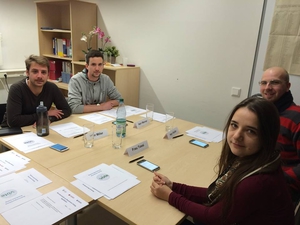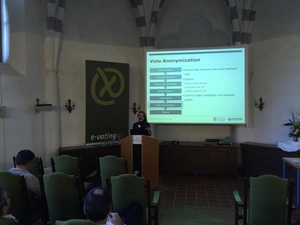BoRoVo (Boardroom Voting)

Motivation
One of the possible practical applications of electronic voting protocols are the elections of smaller scale, such as among board of directors, in university committees, or in classrooms. Such elections are often conducted among small groups of voters, in ad hoc way, and with limited central infrastructure, thus posing a different set of challenges, than large-scale political elections. Currently, they are most often conducted via raising of hands or paper voting, which, however, excludes the voters, that are not physically present in the same room as others, from participating in the voting. Therefore, an application that enables secure remote electronic voting, would be practical in cases of some of the voters being able to participate also while travelling or not being able to attend the meeting in person for some other reason. A typical application setting for such voting is shown in Figure 1.

Results
For enabling decentralised boardroom voting, BoRoVo, an application for Android smartphones has been developed, implementing a protocol that enables private, verifiable and robust decentralized boardroom voting and elections. The usability of the application was evaluated in user studies, resulting in usability score well above average (84,58 out of 100).
The BoRoVo application with the user manual is available on request.
The development of the application and the application have been presented at several scientific venues, e.g. at the 6th International Conference on Electronic Voting (EVOTE) 2014 (see Figure 2).

Acknowledgement
The project 'BoRoVo': Board Room Voting is funded by the German Federal Ministry of Education and Research (BMBF) under grant no. 01IS12054. The authors assume responsibility for the content.
Publications
Efficiency Evaluation of Cryptographic Protocols for Boardroom Voting: Kulyk, O.; Neumann, S.; Budurushi, J.; Volkamer, M.; Haenni, R.; Koenig, R.; Bergen, P. von. 2015. International Conference on Availability, Reliability and Security (ARES), Toulouse, France, 24.-28.08.2015, 224–229, IEEE, Piscataway, NJ. doi:10.1109/ARES.2015.75
Electronic Voting with Fully Distributed Trust and Maximized Flexibility Regarding Ballot Design: Kulyk, O.; Feier, C.; Köster, T.; Neumann, S.; Volkamer, M. 2014. Electronic Voting: Verifying the Vote (EVOTE), Lochau, Austria, 29-31 October 2014, 1–10, IEEE, Piscataway (NJ). doi:10.1109/EVOTE.2014.7001142
A Usable Android Application Implementing Distributed Cryptography For Election Authorities: Neumann, S.; Kulyk, O.; Volkamer, M. 2014. Ninth International Conference on Availability, Reliability and Security (ARES) - Ninth International Workshop on Frontiers in Availability, Reliability, and Security (FARES), Fribourg, Switzerland, 8-12 September 2014, 207–2016, IEEE, Piscataway (NJ). doi:10.1109/ARES.2014.35
Towards a Practical Cryptographic Voting Scheme Based on Malleable Proofs: Bernhard, D.; Neumann, S.; Volkamer, M. 2013. E-voting and identity : 4th International Conference, Vote-ID 2013, Guildford, UK, July 17-19, 2013 ; proceedings. Ed..: Schneider, Steve; Heather, James; Teague, Vanessa, 176–192, Springer, Berlin. doi:10.1007/978-3-642-39185-9_11
